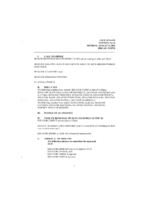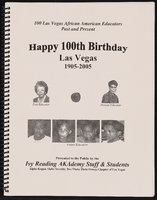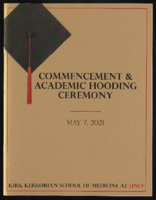Search the Special Collections and Archives Portal
Search Results

Transcript of interview with Anna Sipl Meyers by Leita Kaldi Davis, February 12, 2012, February 29, 2012, March 27, 2012, April 6, 2012, April 24, 2012, May 3, 2012, May 9, 2012, May 16, 2012, October 19, 2012, November 16, 2012, & December 7, 2012
Date
Archival Collection
Description
From concentration to ownership of Las Vegas casinos, Meyers owned the Cashbah and the and Queen of Hearts in downtown Las Vegas. Interview dates: 2/12/2012, 2/29/2012, 3/27/2012, 4/16/2012, 4/24/2012, 5/3/2012, 5/9/2012, 5/16/2012, 10/19/2012, 11/16/2012, 12/7/2012.
Text

Interview with Kenneth Giles, February 10, 2005
Date
Archival Collection
Description
Text

Meeting minutes for Consolidated Student Senate, University of Nevada, Las Vegas, August 09, 2004
Date
Archival Collection
Description
Text

"100 Las Vegas African American Educators Past and Present" booklet
Date
Archival Collection
Description
From the Alpha Kappa Alpha Sorority, Incorporated, Theta Theta Omega Chapter Records (MS-01014) -- Ivy Leaf magazines and event souvenir programs file. Full title of booklet: "100 Las Vegas African American Educators Past and Present. Happy 100th Birthday Las Vegas, 1905-2005. Presented to the Public by the Ivy Reading AKAdemy Staff & Students, Alpha Kappa Alpha Sorority, Inc./Theta Theta Omega Chapter of Las Vegas."
Text

Kirk Kerkorian School of Medicine at UNLV 1st Commencement and Academic Hooding Ceremony
Date
Archival Collection
Description
Commencement program from University of Nevada, Las Vegas Commencement Programs and Graduation Lists (UA-00115).
Text

Angela Castro oral history interview: transcript
Date
Archival Collection
Description
Oral history interview with Angela Castro conducted by Stefani Evans, Cecilia Winchell, Kristel Peralta, Vanessa Concepcion, and Ayrton Yamaguchi on November 05, 2020 for the Reflections: The Las Vegas Asian American and Pacific Islander Oral History Project. Castro begins the interview by talking about her early life, childhood, what Guam was like, and the history of her parents and grandparents. She describes the difference in public and private education in Guam and compares it to the United States. She explains the reason why she moved to Las Vegas, Nevada in 1998 and attended the University of Nevada, Las Vegas for public relations. Castro then talks about the differences between older and newer generations, the political atmosphere in Guam, and the differences between the United States and Guam in politics. She also talks about the discrimination she has experienced throughout her life and diversity in the workplace. Lastly, she describes her culture and traditions during holidays, the struggles with an absence of culture within her family, and her personal religious beliefs.
Text
Wilbur and Toni Clark Papers
Identifier
Abstract
The Wilbur and Toni Clark Papers date from 1944 to 1991, with the bulk from 1953 to 1963 and document the lives of Wilbur and Toni Clark in Las Vegas, Nevada and the development of the Desert Inn Hotel and Casino. The collection includes correspondence from Wilbur Clark to those he identified as important individuals including government officials and celebrities. It also includes materials related to Clark’s plan of building luxury apartments near the Desert Inn, and newspaper clippings and scrapbooks about the Clarks and the Desert Inn. The collection contains some audiovisual materials including Wilbur and Toni Clark's home movies, news footage, and film footage of Las Vegas, Nevada and the Desert Inn.
Archival Collection
John Levy Lighting Productions, Inc. Records
Identifier
Abstract
The John Levy Lighting Productions, Inc. Records (approximately 1990-2022) contain correspondence, invoices, contracts, expense reports, newspaper and magazine clippings, photographs, slides, and digital files detailing the development of various projects primarily in Las Vegas, Nevada. The records also contain architectural lighting drawings, electrical schematics and design details, conceptual sketches, and artist renderings of projects in Las Vegas, throughout United States, and various international locations.
Archival Collection
Thomas Hickey Political Papers
Identifier
Abstract
The Thomas Hickey Political Papers (1964-1996) contain the professional files of Hickey’s career as a Nevada State Assemblyman and Senator. Materials include constituent correspondence, voting records, memoranda, newspaper clippings, bills, and research documentation on topics such as the Yucca Mountain Nuclear Waste Repository, the Equal Rights Amendment (ERA), education, health, prisons, finance, and Nevada infrastructure. The collection highlights Hickey’s role on committees including finance, transportation, government affairs, and ways and means.
Archival Collection

Amber Diskin oral history interview: transcript
Date
Archival Collection
Description
Oral history interview with Amber Diskin conducted by Barbara Tabach on January 5, 2018 for the Remembering 1 October Oral History Project. In this interview, Amber Diskin discusses her experience at the Route 91 Harvest music festival during the October 1, 2017 mass shooting in Las Vegas, Nevada. Diskin talks about finding her way home after escaping the crowds and letting her family and friends know she was not hurt. She speaks of the aftermath of the shooting, including how her children were affected, the post-traumatic stress disorder she developed, and how the shooting has affected her love of concerts. As a native Nevadan, she shares her views of Las Vegas and how her sense of community deepened after this event. Diskin ends the interview by discussing her appreciation for the first responders and the gift baskets she helped distribute to hospitals, police stations, and the fire department.
Text
